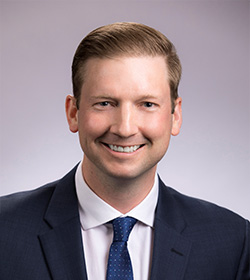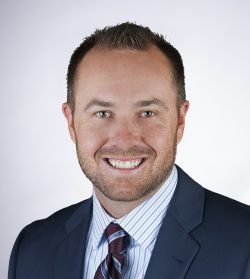News & Commentary
- Thursday, 04 August 2022
- Written by Rogers Sheffield & Campbell
R. Scott Mullen Joins the Law Firm of Rogers, Sheffield & Campbell

Rogers, Sheffield & Campbell, LLP is pleased to announce that R. Scott Mullen has joined the firm, effective January 24, 2022
Scott Mullen is an associate in Rogers, Sheffield & Campbell's civil litigation practice group. Mr. Mullen has broad experience in all manners of litigation, including disputes regarding real estate, intellectual property, products liability, trusts and estates, labor and employment, construction, entertainment, and general business-to-business and contract matters.
Prior to joining the firm, Mr. Mullen worked in the Los Angeles office of the international law firm Greenberg Traurig, LLP, for five years and for the highly respected Ventura law firm Myers, Widders, Gibson, Jones & Feingold, LLP
Read more: R. Scott Mullen Joins Rogers Sheffield & Campbell →
- Tuesday, 19 March 2019
- Written by StudioIII
Travis C. Logue and Jason W. Wansor, attorneys with Rogers, Sheffield & Campbell, LLP, who represent Theo Kracke, have prevailed in trial against the City of Santa Barbara. On March 8, 2019, Ventura Judge Borrell issued his Final Statement of Decision in Kracke v. City of Santa Barbara (Case No. 56-2016-00490376) overturning Santa Barbara’s 2015 short-term rental ban in the Coastal Zone.
The judge’s ruling effectively allows short-term vacation rentals in the Coastal Zone immediately.
The court ruled and ordered that “…a writ shall issue commanding the City of Santa Barbara to allow short-term vacation rentals in the Coastal Zone on the same basis as the City had allowed them to operate prior to June 23, 2015, until such time as the City obtains a Coastal Development Permit or otherwise complies with the provisions of the Coastal Act of 1976, including Public Resources Code 30600, and Title 28 of the Santa Barbara Municipal Code.”
According to Mr. Kracke, “This is a huge victory for families who rely on affordable accommodations to enjoy the Coastal Zone. The City fought us every step of the way and forced me to incur enormous legal fees. Let’s hope City leaders finally see the light and work on reasonable regulation rather than blanket prohibition. I am genuinely optimistic that new leadership on the council will choose to work collaboratively with the Coastal Commission and the community rather than antagonistically.”
In a March 11 letter to the Mayor and City Council Members, Mr. Logue urged the body to avoid an appeal: “The City should embrace providing more affordable access to the Coastal Zone and focus on establishing reasonable regulation through the required legal channels rather than continue this multi-year litigation and escalate our client’s fees which, we assure you, are substantial. Choosing this path forward as opposed to impeding the public’s access to affordable accommodations within the Coastal Zone, is a ‘win-win’ for the public and the Santa Barbara community; however, the course and resolution of this matter remain squarely in your hands.”
The next step for Mr. Kracke is to recover his considerable legal fees under the private attorney general doctrine (Code of Civil Procedure § 1021.5). Addressing the City’s early attempt to have the lawsuit thrown out with an anti-SLAPP motion that was widely criticized by legal analysts, Mr. Logue claims, “Since Day One, our client has been subjected to the City’s belligerent litigation tactics directed to escalate his legal fees and break his will. The City’s primary purpose in bringing the motion was to unnecessarily amplify our clients’ attorneys’ fees and stall the proceedings. While the City succeeded in the delay and amplification of costs, ironically, it now faces the distinct possibility that Mr. Kracke may be reimbursed for those same increased costs. Ultimately, Mr. Kracke may be entitled to reimbursement of attorneys’ fees in the seven figures.”
Still pending is Mr. Kracke’s cause of action for civil penalties under the Coastal Act (Public Resources Code § 30820(a)(1)). That hearing will occur in May.
- Thursday, 21 February 2019
- Written by StudioIII
After 2 ½ years of tough litigation against the City of Santa Barbara, it appears attorneys Travis C. Logue and Jason W. Wansor of Rogers, Sheffield & Campbell, LLP (on behalf of their client, Theo Kracke), are one step closer to overturning the City’s 2015 decision to ban short-term vacation rentals in the Coastal Zone.
In the Tentative Decision and Proposed Statement of Decision dated February 20, 2019, the court ruled and ordered that “…a writ shall issue commanding the City of Santa Barbara to allow short-term vacation rentals in the Coastal Zone on the same basis as the City had allowed them to operate prior to June 23, 2015, until such time as the City obtains a Coastal Development Permit or otherwise complies with the provisions of the Coastal Act of 1976, including Public Resources Code section 30600, and Title 28 of the Santa Barbara Municipal Code.”
According to Mr. Kracke, “This is a tentative decision, so we are cautiously optimistic. Nevertheless, we are thrilled it appears the court embraced our arguments that the City acted improperly. If the Final Decision falls our way, it will be a victory for those people who could not otherwise enjoy the Santa Barbara coastline. Given the City’s aggressive tactics over the last few years, I am sure this fight will continue.”
In addition, the tentative decision provides, “The court finds that [Mr. Kracke] has prevailed on his first and third causes of action. The judgment in the matter shall include the relief awarded to [Mr. Kracke], as set forth above. This tentative decision is the proposed statement of decision and shall become the court’s final statement unless, within 10 days after announcement or service of the tentative decision (plus five days for service by mail), a party specifies those principal controverted issues as to which the party is requesting a statement of decision or makes proposals not included in the tentative decision.”
Kracke’s lawsuit challenges the City's ban on STVRs, alleging that the City’s actions are illegal and in contravention to various policies set forth in the Coastal Act and the City’s municipal code. Central among these policies are the requirements that the general public must have affordable accommodations within and access to the Coastal Zone. In implementing its ban against STVRs, the City violated these policies and failed to apply for a Coastal Development Permit (CDP) to ensure that its actions conformed to the Coastal Act and its own Local Coastal Plan and municipal code.
The next status conference is scheduled for March 18, 2019, where the court may determine the procedure related to hearing arguments on whether the City is liable for civil penalties under the Coastal Act.
Media Coverage:
JUDGE RULES THOMAS FIRE, DEBRIS FLOW CASES TO BE COORDINATED IN LA COUNTY SUPERIOR COURT
- Friday, 20 April 2018
- Written by RSC Editor
A Ventura County judge has recommended to the Judicial Council that Los Angeles County Superior Court serve as the venue for pretrial coordination proceedings in cases pertaining to the Thomas Fire and Montecito mudslide/debris flow disasters against Southern California Edison.
The order was issued April 16 by Vincent J. O'Neill Jr., coordination motion judge of the Ventura County Superior Court, and designates the Court of Appeal, Second District as the reviewing court.
“We are pleased with the ruling," said Brian Panish of Panish Shea & Boyle LLP. "While Ventura and Santa Barbara counties have excellent judges, Los Angeles County courts are best equipped to handle thousands of complex cases such as this and can efficiently administer the case. We're ready to move forward in seeking justice for our clients," he said.
The Ventura County court determined Thomas Fire and Montecito debris flow cases are complex due to the sheer number of existing complaints filed as well as the amount of witnesses and discovery evidence included with each action.
O'Neill said in his recommendation, "exceptional judicial management will be necessary to handle the included actions to avoid placing unnecessary burden on the court, to reduce litigation costs, and to expedite the cases."
Coordination of the cases in a single courthouse before a single judge promotes efficient use of judicial resources, streamlined litigation procedures, and, importantly, eliminates the opportunity for inconsistent rulings and orders on the same legal issues.
“As a Santa Barbara native with friends and members of my firm being victims of this tragedy, I know all too well that justice delayed is justice denied," says Travis Logue of Rogers Sheffield & Campbell LLP. "For that reason, I too share the sentiments of Judge O’Neill that exceptional judicial management compels transfer of these cases to Los Angeles County,” Logue said.
The court weighed eight factors when ruling in favor of Los Angeles County as the site for pretrial coordination including the convenience of the location to the parties, witnesses and counsel, the parties principal place of business, the ease of travel and availability of accommodations, and the efficient use of court facilities and judicial resources.
The court also noted that while attorneys for the parties have offices in Santa Barbara, Ventura and Los Angeles counties, as well as other counties in California, it was not a factor that weighed in favor of or against a particular venue.
"The impact of the Thomas Fire continues to devastate the many ranchers, farmers and growers who have lost millions in cattle, crops and avocados groves," says Robert Boatman of Gallagher & Kennedy. "Their losses are significant, their cases complex and we're confident Los Angeles County courts and its judiciary will be just in serving our clients," he said.
Wildfire Victim Advocates is comprised of attorneys from the law firms of Panish Shea & Boyle LLP, Walkup, Melodia, Kelly & Schoenberger and Cotchett, Pitre & McCarthy LLP who have joined forces and resources to investigate and prosecute claims for which SCE is responsible, seeking justice for residents and businesses affected by the Thomas Fire and subsequent debris and mud flows in Montecito.
MONTECITO MUDSLIDE STRIKES DAVID M. GROKENBERGER AND FAMILY
- Friday, 20 April 2018
- Written by RSC Editor
The realization that houses might simply vanish didn't start to set in until a 30-foot tree trunk barreled by.
Trina Grokenberger stared out the upstairs window of her white Colonial house Tuesday morning, as a river raged through her front yard.
It was 3:58 a.m. "Dave!" she called to her husband. "We can't leave now, right? That's all trees coming down the driveway."
ROGERS, SHEFFIELD & CAMPBELL PARTNERS WITH PANISH SHEA & BOYLE ON MONTECITO MUDSLIDE LITIGATION
- Friday, 20 April 2018
- Written by RSC Editor
Rogers, Sheffield & Campbell has partnered with the Los Angeles law firm, Panish Shea & Boyle, a highly respected personal injury and mass tort powerhouse, boasting successful Plaintiff verdicts totaling in the billions of dollars. The firms intend to jointly pursue justice and damages for victims of the Montecito Mudslides. For those interested in learning more or initiating a claim against the parties responsible for the recent tragedies, contact Travis C. Logue.
Rogers Sheffield & Campbell LLP have joined forces with Panish Shea & Boyle LLP, Walkup, Melodia, Kelly & Schoenberger, Cotchett, Pitre & McCarthy LLP to seek justice for residents and businesses affected by the Thomas Fire and Montecito Mudslides and to investigate and prosecute claims for which SCE is responsible.
- Friday, 26 January 2018
- Written by RSC Editor
Special Client Bulletin: Montecito Mudslide Disaster
All of us have been deeply moved by the Montecito Mudslide disaster.
Our firm was directly affected. One of our firm’s attorneys, Rebecca Koch, lost her step-mother, Rebecca Riskin, and her father, Ken Grand, was seriously injured. Another firm attorney, David Grokenberger, was lucky to escape with his family, but suffered the total destruction of his house on the 300 block of Hot Springs Road. Several of his immediate neighbors were lost or seriously injured in the debris flow.
Regrettably, it appears the disaster was preventable. Preliminary investigations have revealed the Thomas Fire was likely caused by the negligence of Southern California Edison. Experts believe the subsequent and devastating mudslides would not have occurred but for the loss of vegetation and scorched soil conditions created by the Thomas Fire in the mountains above Montecito. The resulting damages and impact on those affected are unfathomable.
A call to action against the entities responsible for this tragedy has been made. Due to our reputation and strong local ties, we have been in discussions with multiple firms to act as local counsel.
We made the decision to partner with Panish Shea & Boyle, one of the preeminent mass tort litigation firms in California, to represent the victims of the Montecito Mudslides. Combining our firm’s 45 years of experience and commitment to representing the Santa Barbara community, with the vast resources and expertise of Panish Shea & Boyle, we have assembled a strong legal team to prosecute damage claims and seek justice for our clients. We have already engaged a group of experts to assist in building the legal case against Southern California Edison.
We will be holding a free informational workshop on January 30, 6:30 p.m., at the Hyatt Centric, 1111 E. Cabrillo Blvd., Santa Barbara. There will be a presentation by multiple experts, including our attorney, David Grokenberger, who will share his first-hand experience of the event and in dealing with his insurance carrier, State Farm, who recently confirmed coverage for the loss.
In addition, our firm is well equipped to handle all the other types of issues raised by this catastrophe, including real estate, insurance, construction, land use, landlord-tenant, and estate planning.
If you, your family, friend, or neighbor may be interested in pursuing legal action to recover damages or need assistance navigating issues related to the disaster, please contact Travis C. Logue (travis@rogerssheffield.com) or Jason W. Wansor (jason@rogerssheffield.com) for more information.
- Monday, 01 January 2018
- Written by RSC Editor
Grokenberger & Smith Joins Rogers, Sheffield & Campbell
In the most significant local legal industry news in recent memory, local boutique real estate litigation firm, Grokenberger & Smith has joined Rogers, Sheffield & Campbell, effective January 1, 2018.
This addition increases the firm’s robust real estate and litigation departments headed by Travis C. Logue and Jason W. Wansor, respectively.
The attorneys joining the firm are David M. Grokenberger, James H. Smith, Michael Brelje, and Scott G. Soulages.
Mr.Grokenberger is a well-respected civil litigator who handles all types of real estate disputes and transactions. He is routinely engaged in purchase/sale disputes and broker-agent liability matters, and is well known in the local real estate industry. As a longtime Montecito resident, Mr. Grokenberger’s local connections run far and wide.
Mr. Smith is an experienced civil litigator with an expertise in common interest developments, Davis-Stirling, homeowners’ associations, and construction law. He represents dozens of homeowners associations and mid to large scale contractors.
Mr. Brelje is a Director of the County of Santa Barbara Bar Association and former President of the Santa Barbara Barristers. He practices in the firm’s litigation and real estate departments.
Mr. Soulages is born and raised in Santa Barbara. He assists the firm with all types of civil litigation matters, law and motion, and legal research.
The firm is proud to welcome these four excellent attorneys. Their clients will be well-served by Rogers, Sheffield & Campbell, LLP, Santa Barbara’s full service law firm.
GROKENBERGER & SMITH JOINS ROGERS, SHEFFIELD & CAMPBELL
- Friday, 20 April 2018
- Written by RSC Editor
In the most significant local legal industry news in recent memory, local boutique real estate litigation firm, Grokenberger & Smith has joined Rogers, Sheffield & Campbell, effective January 1, 2018.
This addition increases the firm’s robust real estate and litigation departments headed by Travis C. Logue and Jason W. Wansor, respectively.
The attorneys joining the firm are David M. Grokenberger, James H. Smith, Michael Brelje, and Scott G. Soulages.
Mr. Grokenberger is a well-respected civil litigator who handles all types of real estate disputes and transactions. He is routinely engaged in purchase/sale disputes and broker-agent liability matters, and is well known in the local real estate industry. As a longtime Montecito resident, Mr. Grokenberger’s local connections run far and wide.
Mr. Smith is an experienced civil litigator with an expertise in common interest developments, Davis-Stirling, homeowners’ associations, and construction law. He represents dozens of homeowners associations and mid to large scale contractors.
Mr. Brelje is a Director of the County of Santa Barbara Bar Association and former President of the Santa Barbara Barristers. He practices in the firm’s litigation and real estate departments.
Mr. Soulages is born and raised in Santa Barbara. He assists the firm with all types of civil litigation matters, law and motion, and legal research.
The firm is proud to welcome these four excellent attorneys. Their clients will be well-served by Rogers, Sheffield & Campbell, LLP, Santa Barbara’s full service law firm.
- Wednesday, 16 August 2017
- Written by RSC Editor
Estate Planning in a Blended Family
In this era of the blended family, there are many challenging legal issues. Separation and remarriage are currently so common in our nation that blended families have mostly turned into the new standard. At the point when two adults wed and it is possible that either of them has children from a past relationship, the entanglements of ignoring the consequences without a will can bring anguish that intensifies when a partner is deceased. It is advisable that both of the adult partners have legitimate plans established for this eventuality. If you have remarried and haven't met with a legal advisor, now is an ideal opportunity to begin.
- Thursday, 20 July 2017
- Written by Bradley C. Hollister
A couple’s revocable living trust can be freely amended during their joint lifetimes. Amendments can be used to adapt to changes in law, family circumstances, or the couple’s wishes. However, once the first spouse passes away, a revocable living trust usually becomes wholly or partly irrevocable and cannot be easily fixed or modified. Therefore, it must be frequently reviewed and maintained to ensure it achieves its intended purpose.
Read more: Its A Good Time To Review Your Revocable Living Trust →
- Monday, 10 July 2017
- Written by RSC Editor
Santa Barbara was dealt a minor blow as officials for a third time try to get a lawsuit over the city's short-term vacation rental ban thrown out of Ventura County Superior Court.
"This is a victory for those people who could not otherwise enjoy the Santa Barbara coastline."
--Theo Kracke
Read more: Vacation-Rental Lawsuit Against City Of Santa Barbara Moves Forward →
- Friday, 30 June 2017
- Written by RSC Editor
Theo Kracke won a battle in his ongoing lawsuit against the City of Santa Barbara over its decision to ban short-term vacation rentals (STVRs). Earlier this year, the City filed its second demurrer and tried to have the lawsuit dismissed for the third time. However, on June 26, 2017, the court overruled the demurrer and made certain findings that validate the core arguments of the lawsuit. Now that this major obstacle to the lawsuit has been removed, it will proceed in court.
- Thursday, 16 March 2017
- Written by RSC Editor
Jason Wansor and Travis Logue, attorneys with the Santa Barbara law firm of Rogers, Sheffield & Campbell, LLP, are representing Theo Kracke in his lawsuit against the City of Santa Barbara over its ban of short-term vacation rentals.
Read more: Lawsuit Against Santa Barbara's Ban On Short-Term Rentals Can Proceed →
- Friday, 10 March 2017
- Written by RSC Editor
On March 10, 2017, Ventura Judge Mark Borrell issued a ruling to deny the City of Santa Barbara’s anti-SLAPP motion in the lawsuit brought by Theo Kracke challenging the City’s ban of short-term vacation rentals as a violation of the Coastal Act.
Read more: Court Denies City of Santa Barbara's Anti-SLAPP Motion →
- Tuesday, 07 March 2017
- Written by Chris C Jones
We have all been twisted up and down by the economy over the last 10 years. In 2008, most people told me that they had experienced a decline of 30 to 50 % of their investments. With news of bank failures, manipulation of the stock market, and the collapse of the mortgage lending industry, it appeared back then that there was no place of refuge. This is thankfully not 2008, but there will always be ups and downs that play with our investments and our minds.
- Friday, 03 March 2017
- Written by RSC Editor
The March 3, 2017 front page of the Santa Barbara Newspress featured extensive quotes from Rogers, Sheffield & Campbell attorney, Jason Wansor. Yesterday, the Ventura court heard argument on Motions for Demurrer, Anti-SLAPP, and Preliminary Injunction. The Firm is representing Theo Kracke in his lawsuit against the City over its ban of short-term vacation rentals.
- Friday, 17 February 2017
- Written by RSC Editor
On February 16, 2017, Travis C. Logue and Jason W. Wansor, attorneys with the Santa Barbara law firm of Rogers, Sheffield & Campbell, LLP, filed Theo Kracke’s Opposition to the City of Santa Barbara’s Anti-SLAPP (Strategic Lawsuit Against Pubic Participation) Motion.
The Coastal Commission’s letter of December 6, 2016 states the Coastal Commission’s current position that any regulation of short-term vacation rentals within the Coastal Zone amounts to “development” and requires either a Coastal Development Permit (CDP) or an amendment to the City’s Local Coastal Program (LCP). The relief requested in Mr. Kracke’s Petition is that the City either obtain a CDP or amend its LCP. Even though Mr. Kracke’s Petition is consistent with the Coastal Commission’s policy on the issue, the City characterizes the Petition as “frankly outrageous.” In addition, the City asserts Mr. Kracke’s legal challenge is intended to chill the City’s freedom of speech under the First Amendment and is a “strategic lawsuit against public participation” under Code of Civil Procedure Section 425.16. The City also requests an award of attorneys’ fees.
Read more: Rogers, Sheffield & Campbell, LLP Opposes City of Santa Barbara’s Anti-SLAPP Motion →
- Tuesday, 14 February 2017
- Written by Chris C Jones
For most people, estate planning includes transferring assets to their children or grandchildren without paying any taxes. The problem is that these transfers are typically subject to federal taxes. The transfers are either treated as gifts for which gift taxes are owed, or sales for which capital gains taxes are owed. But there is a solution to this dilemma. Because of discrepancies in the Internal Revenue Code, it is possible to transfer the appreciation of assets to other generations without having to pay either tax. This technique is through the use of what is known as Intentionally Defective Grantor Trusts.
- Tuesday, 31 January 2017
- Written by Chris C Jones
You have worked long and hard to accumulate your investment properties. Now you are faced with the problem of how best to plan for transfers to family members without having your investments decimated by income and estate taxes. If you make an outright gift, gift taxes are due. Moreover, you no longer control what you have given away. Transfers at death incur estate taxes, and the taxes are usually paid with funds that have themselves been taxed.
Don’t despair. There is a solution that allows you to both transfer your properties and retain control after the transfer: the family limited partnership.
- Tuesday, 17 January 2017
- Written by Chris C Jones
Remember way back in 2008? Over 20% of American real estate owners had property that was worth less than the outstanding debt on the property. In the meantime, the lending industry became increasingly stringent, and fewer people qualified for loans, especially in areas like Santa Barbara. For anyone that occupied real estate as a residence, a foreclosure or short sale resulted in the lender sending a 1099 form reporting the amount of the debt that was written off. That debt forgiveness was included as income, and counted in the income tax calculation. All in all, that was a tough climate for investors.
- Tuesday, 03 January 2017
- Written by Chris C Jones
We are fortunate to live in an area where strong demands for real estate have pushed the prices to unimagined levels. For many of us, home ownership has increased our net worth beyond the exemption amount from federal estate taxes. Since one the goals of estate planning is to minimize the costs associated with transferring assets to your beneficiaries, it pays to make transfers in a way that minimize, if not eliminate, transfer taxes such as gift and estate taxes. Personal residence trusts are a valuable tool in achieving that goal by leveraging the value of gifts.
- Tuesday, 20 December 2016
- Written by Chris C Jones
If one of the primary goals of estate planning is to have your wishes carried out, even when you are incapacitated or deceased, that requires choosing people to act on your or your children’s behalf as you intend. When you can’t speak for yourself, who can you count on to speak for you? You have a choice: you can either leave it to chance, or you can create certainty.
Read more: Guardians and Conservators: What’s the Difference? →
- Monday, 05 December 2016
- Written by RSC Editor
Rogers, Sheffield & Campbell, LLP Files Suit Against City of Santa Barbara
 Theo Kracke
Theo Kracke
On November 30, 2016, Travis C. Logue and Jason W. Wansor, attorneys for the Santa Barbara law firm of Rogers, Sheffield & Campbell, LLP, filed a Petition for Writ of Mandate and Complaint for Civil Penalties for Violation of the California Coastal Act against the City of Santa Barbara (the “City”).
The suit stems from the City’s decision to ban short-term vacation rentals (STVRs). The prohibition will apply to all STVR properties beginning January 1, 2017.
The petition was filed on behalf of the firm’s client, Theo Kracke, a 35-year resident of Santa Barbara, and proprietor of Paradise Retreats World Class Vacation Rentals. Mr. Kracke has been engaged in operating, managing and servicing vacation rentals in and around the City since 2006, many of which are located within the City’s Coastal Zone, as defined under the Coastal Act.
- Tuesday, 08 November 2016
- Written by Chris C Jones
One of the advantages of trusts is privacy. Unlike the probate of a will, there is no legal requirement that the trustee file the trust with the local court. However, privacy is also one of the disadvantages of trusts. Unless the Trustee provides information about the trust and trust assets to the trust beneficiaries, the beneficiaries will have no idea whether or not they have received all that they are entitled to, or whether the trustee has properly done his or her job.
- Tuesday, 25 October 2016
- Written by Chris C Jones
A key goal of what we refer to as “estate planning” is to preserve a legacy for your family. How can you get as much of your estate as possible into the hands of your beneficiaries? That means minimizing, if not eliminating erosion from taxes and court related fees. While there is uncertainty surrounding the future rates of gift and estate taxes, you may be tempted to put your plans on hold. But strategies exist to pass significant assets to your beneficiaries at little or no tax cost to you.
- Tuesday, 04 October 2016
- Written by Chris C Jones
The purpose of this article is to explain the goals of estate planning so as to make you an expert on the subject. After reading this article, you will not only understand this for yourself, but also be able to explain it to your friends and family.
- Tuesday, 20 September 2016
- Written by Chris C Jones
Life is full of risks. We may get sued because of the activities we engage in, what we own or even who we know. Virtually every aspect of life can be the source of creditor’s claims, litigation and judgments. Being alive is risky business! You have worked hard to accumulate your assets, now how can you protect them for yourselves and your heirs? Is it really possible to have total asset protection? This article is intended to describe the tools that can offer near, if not complete, protection from life’s legal risks.
- Tuesday, 06 September 2016
- Written by Travis C Logue
One of the most common types of real estate cases we litigate are easement disputes. Since easements usually involve one's personal residence or investment property, such disputes may be deeply emotional and expensive.
What is an easement? Quite simply, an easement is the right to use another's land for a limited purpose. Commonly, neighbors are granted easements for uses, such as, driveways, fences, hedges, scenic views, and utilities. Most easements are recorded and appear on your property's title report, which is generated during a purchase and escrow. Since it is a contractual obligation, one risk of having an easement on title is you could become a party in a future lawsuit if a dispute arises.
- Tuesday, 16 August 2016
- Written by Chris C Jones
If you’re like most people, you have the best of intentions to execute plans for how you want your estate distributed when you die or your affairs handled should you become incapacitated. Unfortunately, unless you take action, those best intentions will not be enough. Here are six of the most common estate planning mistakes people make:
Read more: Six Estate Planning Mistakes Most Commonly Made →
- Tuesday, 02 August 2016
- Written by Chris C Jones
The primary goal of estate planning is to have our wishes carried out, especially when we are not here. Those wishes include care for ourselves if we become disabled, and care for those that matter the most to us, for example, the pet companions that have made such a difference for us. You naturally want to make sure that your dear pet companions are cared for when you are no longer able to be their caregiver. They have served you and added to the quality of your life. How can you guarantee that others will provide for them as you would wish?
- Tuesday, 19 July 2016
- Written by Chris C Jones
People often think of life insurance as “tax-free,” but that’s not entirely true. Life insurance proceeds generally are income-tax-free to your beneficiaries, but if you own the policy at your death, the proceeds may be subject to estate taxes. One of the best ways to keep life insurance out of your taxable estate is to place the policy in an irrevocable life insurance trust (an “ILIT”).
If you’re thinking about setting up an ILIT for an existing policy, consider doing so before the end of the year, particularly if it’s a high cash value policy.
Read more: Considering an Irrevocable Life Insurance Trust? →
- Friday, 01 July 2016
- Written by Rogers Sheffield & Campbell
Jason W. Wansor Joins the Law Firm of Rogers, Sheffield & Campbell

Rogers, Sheffield & Campbell, LLP is pleased to announce that Jason Wansor has joined the firm, effective July 1, 2016.
Mr. Wansor is an accomplished civil litigator. His practice is focused on personal injury, real estate, land use, hospitality, products liability, business torts, construction, and will and trust contests.
Mr. Wansor's analytical strengths allow for the accurate assessment of potential exposure and liability and the creation and implementation of sophisticated litigation strategies. Mr. Wansor's strategic sense and writing abilities lead to successful results, whether by keen negotiation or motions leading to the disposition of cases.
- Tuesday, 21 June 2016
- Written by Chris C Jones
Recent changes in federal tax law suggest that we might benefit from rethinking how we set up many estate plans. We now have a generous $5,340,000 per person estate tax exclusion, which is adjusted by the cost of living. That means in 2015, it will increase to at least $5,450,000 per person. At that rate, it won’t be long before it reaches $6,000,000 per person, so that the first $12,000,000 per couple will pass to the next generation free of estate tax.
Read more: Should You Amend Your Family Trust to Eliminate the “Bypass” Trust? →
- Friday, 10 June 2016
- Written by Rogers Sheffield & Campbell
Travis C. Logue was recently selected to serve as Trustee of the Santa Barbara Club Preservation Foundation, a nonprofit public benefit corporation engaged in charitable and educational activities.
Read more: Travis Logue Selected As Trustee For The Santa Barbara Club Preservation Foundation →
- Tuesday, 24 May 2016
- Written by Chris C Jones
Our community has a long tradition of charitable giving. We are so well known for our charitable tradition that we have been the subject of numerous regional and national articles on that topic. One of our many resources are charitable foundations. These organizations both support the many charities in our community and provide a resource for you in making charitable gifts in your estate planning.
- Tuesday, 10 May 2016
- Written by Chris C Jones
What does care custodian mean to you? A friend or acquaintance that visits, runs errands, pays bills, cooks, cleans, administers medications, and takes care of other pressing needs?
Probate Code Section 21350 provides that gifts to “care custodians” are invalid. This provision of the code was drafted and adopted in the early 1980′s as part of EDAPCA (Elder and Dependent Adult Civil Protection Act) when it became clear to lawmakers and lawyers alike that nurses, housekeepers and care givers were taking advantage of the impaired and the elderly. These laws were codified as Probate Code Section 21350 in 1997.
- Tuesday, 26 April 2016
- Written by Chris C Jones
With the high price of real estate, we increasingly see arrangements between parents and children, unmarried couples, or friends who pool money to buy residential property. Owners often do not understand their rights and responsibilities. This article is intended to educate potential co-owners by asking questions that affect their relationship.
A written co-ownership agreement maximizes the odds of a successful relationship. It does so in two ways. First, it documents the parties’ understanding. The best time to decide what each person gives and receives, and when, is before any disagreements arise. Secondly, creating the agreement means that the parties must think about and resolve issues they otherwise might not consider. Resolution is much easier before we have a stake in the outcome.
- Wednesday, 06 April 2016
- Written by Chris C Jones
Paper, paper and still more paper!
When can these documents be destroyed? We get questions about tax backup documentation from clients often. To assist you, we provide some ideas to carefully consider when deciding about destruction of any documents.
Read more: Can it be Trashed Now? Tax Record Retention Guidelines →
- Wednesday, 23 March 2016
- Written by Chris C Jones
Federal and state taxes are important factors to consider when administrating a trust, going through probate court, or in any stage of the estate planning process. Taxes are so important that even the idea of an estate exists largely for taxation purposes. After all, as the name implies, only the “taxable estate” is subject to taxation after death. For your estate to survive the probate process intact, you must understand your taxable estate and how to protect it.
- Tuesday, 08 March 2016
- Written by Chris C Jones
One of the primary goals of estate planning is to minimize the costs associated with wealth transfer, including court costs and taxes. While most people associate estate taxes with estate planning, we must also consider how to minimize or avoid both property and income taxes. Proper planning makes more of your assets available for your care during your lifetime, and for your beneficiaries at your death.
- Tuesday, 23 February 2016
- Written by Rogers Sheffield & Campbell
Rogers, Sheffield & Campbell, LLP is pleased to announce that Travis C. Logue has been selected by Super Lawyers to the 2016 Southern California Rising Stars list. Mr. Logue was also named to the list in 2015.
Each year, no more than 2.5 percent of the lawyers in the state are selected by the research team at Super Lawyers to receive this honor.
Read more: Travis Logue Selected to the 2016 California Super Lawyers List →
- Monday, 15 February 2016
- Written by Rogers Sheffield & Campbell
Rogers, Sheffield and Campbell, LLP is pleased to announce that Travis Logue, a partner of the firm, has been elected to the Santa Barbara County Bar Association’s Board of Directors. Travis is a member of the State Bar of California and the District of Columbia Bar, and is a licensed California real estate broker.
Read more: Travis Logue Elected to Santa Barbara County Bar Association Board of Directors →
©2024 | Rogers. Sheffield & Campbell, LLP | All rights reserved











